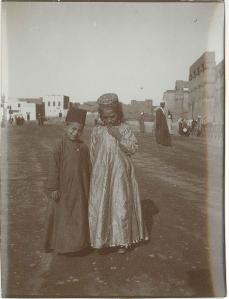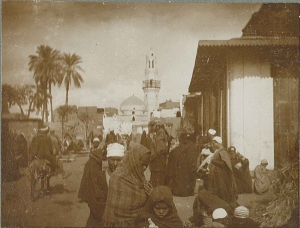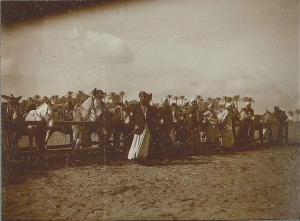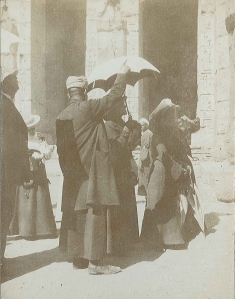West meets East
Marjorie came to Egypt with the primary goal of seeing its ancient past but in doing so she could not help but be immersed into the world that contemporary Egypt had to offer. In fact one of the first things she writes about on her arrival to Egypt are the Egyptians themselves. She writes, “Alexandra harbor was big and full of boats and the town itself is a busy seaport. The houses are big and horribly modern – indeed there is nothing at all attractive about the city. But the people, that is another thing.” She goes on to describe their appearances to her mother paying special attention to their dress, such as their “red tarboosh with black tassel” and “their gown, belted in at the waist . . . of blue . . . cloth, cotton or Arab satin.” She seems taken aback by the traditional burqas worn by women stating that, “the women don’t count for much in this country, they have no part in the religion and the richer ones can’t leave their houses except in a closed carriage. Poor things.”
Marjorie was amazed by Egyptian city life in Cairo,
The street below is crowded with Arabs crying their wares and offering to sell you monkeys, post cards, pans pipes, fly brushes ostriche plumes, embroideries scarabs, donkey beads, inlaid boxes and crocodiles! Then there are dragomen [guides and interpreters for westerners] eager to show you the sights and water carriers with skins full of water, three feet long on their shoulders, and men with huge stone or glass jars of lemonade and in their hands two little brass bowls for you to drink out of which they keep clinking together to make you know they are there. Then too there are some beggars and groups of tumbling acrobatic children. In the roadway, beautiful carriages are continually passing, the coachman and footman, or “carvasse”, wearing gay livery and two sais runners in front to clear the way. These latter carry long light poles and their uniform has a white or pale lavendar skirt and long flowing sleeves, and then a jacket of dark velvet embroidered in gold and a little cap to match. They run with the same erectness of carriage with which they walk – it must be very tiring – but looks stunning.
The most fascinating of all to her were the various shops lining the streets of Cairo. Her guide—or dragoman—Mahomet, took their party to a bazaar in “the most oriental part, and therefore the dirtiest,” but as Marjorie notes, “dirt is so a part of everything fascinating in Cairo that you almost forget that it is there.” She found this bazaar particularly appealing because goods were both produced and traded there. Everything from medicine, to perfume, to brass lamps were available for purchase. So much variety that Marjorie was “heartsick that [she could not] bring a trunk full home.” Marjorie was particularly enchanted by the traditional methods used to make goods.
Take her description of a potter for example.
When we saw them making “Koolehs” or small water jars in a doorway close by and we stopped a moment to watch them. It was in a tiny thatched roofed hut that the man sat, working a revolving disque with his feet and shaping with his fingers a chunk of grey clay that lay on the disk, into the most symmetrical vases & jars. We watched him for about five minutes & he had made six different varieties! You see nothing has been changed here since the days of the Bible – is not this truly “the Potter & his wheel”?
It is important to note that this was the era of “The White Man’s Burden.” While western imperialism certainly exploited the colonized people many had altruistic intentions. Many believed that they were modernizing these “less developed” parts of the world, Egypt included. In fact the Mandate System established after the First World War in Arab countries such as Iraq, Syria, and Palestine stipulated that the imperial power (either France or Britain) guide their colony towards independence as soon as possible. However these were the times in which Marjorie lived and therefore influenced her opinions. She often makes gross generalizations about the Arab people.
The new moon had just risen, and a Bishareen Boy came softly up behind me and said “what you say when you see the new moon”? I told him the little superstition about seeing it over your right shoulder with money in your pocket and he seemed much interested & said “We say ‘Br-r-r’, and that bring us good luck all the rest of the month” – a simple means enough wasn’t it? And I’ve no doubt he believed it – They are such a child-like set of people. Indeed all the Arabs are, and they are always ready for a joke. And what a memory they have for faces – you come to the Bazaars one day and enquire the price of a certain string of beads, and the minute you reappear – perhaps days after, that same string
is poked out at you & they even remember the exact price you offered for it.
You can see here she’s trying to make an objective (and positive) observation but can’t help but have an aura of cultural superiority as she does it. Regardless, its clear that this trip was a huge cultural experience for Marjorie and its easy to see how it sparked a life long love of traveling.







